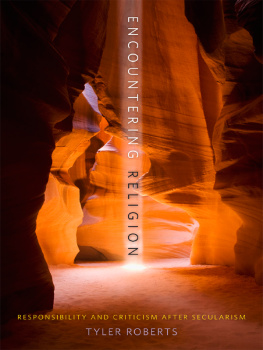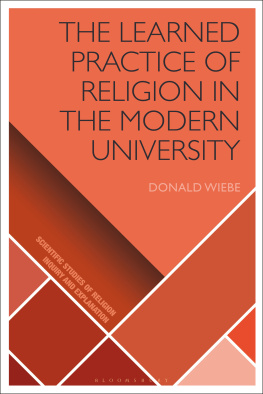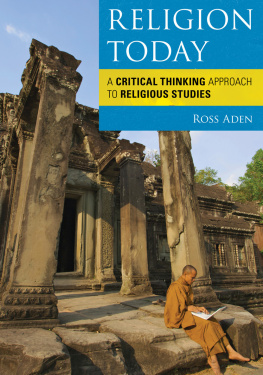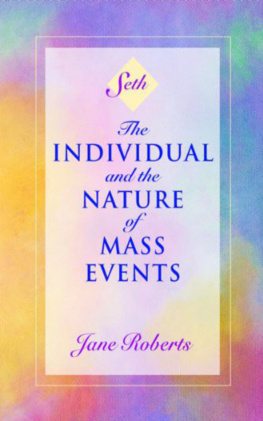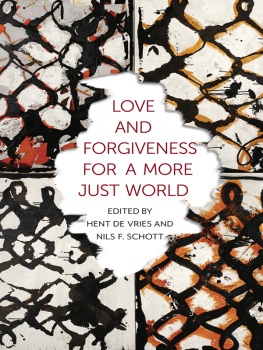ENCOUNTERING RELIGION
Insurrections: Critical Studies in Religion, Politics, and Culture
INSURRECTIONS:
CRITICAL STUDIES IN RELIGION, POLITICS, AND CULTURE
Slavoj iek, Clayton Crockett, Creston Davis, Jeffrey W. Robbins, Editors
The intersection of religion, politics, and culture is one of the most discussed areas in theory today. It also has the deepest and most wide-ranging impact on the world. Insurrections: Critical Studies in Religion, Politics, and Culture will bring the tools of philosophy and critical theory to the political implications of the religious turn. The series will address a range of religious traditions and political viewpoints in the United States, Europe, and other parts of the world. Without advocating any specific religious or theological stance, the series aims nonetheless to be faithful to the radical emancipatory potential of religion.
After the Death of God, John D. Caputo and Gianni Vattimo, edited by Jeffrey W. Robbins
The Politics of Postsecular Religion: Mourning Secular Futures, Ananda Abeysekara
Nietzsche and Levinas: After the Death of a Certain God, edited by Jill Stauffer and Bettina Bergo
Strange Wonder: The Closure of Metaphysics and the Opening of Awe, Mary-Jane Rubenstein
Religion and the Specter of the West: Sikhism, India, Postcoloniality, and the Politics of Translation, Arvind Mandair
Plasticity at the Dusk of Writing: Dialectic, Destruction, Deconstruction, Catherine Malabou
Anatheism: Returning to God After God, Richard Kearney
Rage and Time: A Psychopolitical Investigation, Peter Sloterdijk
Radical Political Theology: Religion and Politics After Liberalism, Clayton Crockett
Radical Democracy and Political Theology, Jeffrey W. Robbins
Hegel and the Infinite: Religion, Politics, and Dialectic, edited by Slavoj iek, Clayton Crockett, and Creston Davis
What Does a Jew Want? On Binationalism and Other Specters, Udi Aloni
A Radical Philosophy of Saint Paul, Stanislas Breton, edited by Ward Blanton, translated by Joseph N. Ballan
Hermeneutic Communism: From Heidegger to Marx, Gianni Vattimo and Santiago Zabala
Deleuze Beyond Badiou: Ontology, Multiplicity, and Event, Clayton Crockett
Self and Emotional Life: Merging Philosophy, Psychoanalysis, and Neuroscience, Adrian Johnston and Catherine Malabou
The Incident at Antioch: A Tragedy in Three Acts / LIncident dAntioche: Tragdie en trois actes, Alain Badiou, translated by Susan Spitzer
Philosophical Temperaments: From Plato to Foucault, Peter Sloterdijk
To Carl Schmitt: Letters and Reflections, Jacob Taubes, translated by Keith Tribe
ENCOUNTERING RELIGION
Responsibility and Criticism After Secularism
TYLER ROBERTS
COLUMBIA UNIVERSITY PRESS
NEW YORK
Columbia University Press
Publishers Since 1893
New York Chichester, West Sussex
cup.columbia.edu
Copyright 2013 Columbia University Press
All rights reserved
E-ISBN 978-0-231-53549-6
Library of Congress Cataloging-in-Publication Data
Roberts, Tyler T., 1960-
Encountering religion : responsibility and criticism after secularism / Tyler Roberts.
pages cm. (Insurrections)
Includes bibliographical references (pages) and index.
ISBN 978-0-231-14752-1 (cloth : alk. paper) ISBN 978-0-231-53549-6 (electronic)
1. ReligionPhilosophy. 2. Social sciences. I. Title.
BL51.R576 2013
200.7dc23
2012039916
A Columbia University Press E-book.
CUP would be pleased to hear about your reading experience with this e-book at .
COVER PHOTO: Getty Images
COVER DESIGN: Milenda Nan Ok Lee
References to websites (URLs) were accurate at the time of writing. Neither the author nor Columbia University Press is responsible for URLs that may have expired or changed since the manuscript was prepared.
For Madeleine, Will, and Emma
We were to be freed from superstition; instead the frozen hopes and fears which attached themselves to rumored dictates of revelation have now attached themselves to the rumored dictates of experience. Our education is sadly neglected: we have not learned in the moral life, as the scientists have in theirs, how to seek and press to the limits of experience; so we draw our limits well short of anything reason requires.
STANLEY CAVELL, THE SENSES OF WALDEN
CONTENTS
This book has been a long time in the making and it was only with the support of family and friends, colleagues and students, that I was able to see it to the end. I hope these few words of acknowledgment begin to convey the gratitude I feel for their care and generosity.
I thank first present and past members of the Department of Religious Studies at Grinnell College, including Tim Dobe, Caleb Elfenbein, Ed Gilday, Harold Kasimow, Henry Reitz, and Kathleen Skerrett. Much of what I write about here had its genesis in conversations with these colleagues about our curriculum and our research. I couldnt have asked for a more congenial and stimulating setting in which to reflect on the current state of the field. In particular, I want to thank Ed Gilday, my partner in developing our course on method and theory, for the many long conversations we have had about the field, for his enthusiasm for my work, and for the critical acumen he brought to bear on the chapter drafts he read.
Speaking of congenial and stimulating settings, I want thank to Chuck Matthewes and Kurtis Schaeffer for organizing and leading a fantastic NEH Summer Seminar at the University of Virginia on The Study of Religion in the summer of 2011. Chuck and Kurtis assembled a group of scholars eager to test ideas with one another and gave us the space to go at it. For their contributions to the seminar, I thank Clayton Crockett, Greg Erickson, Jennifer Eply, Jennifer Gurley, Angie Heo, Joseph Laycock, Brenna Moore, Matt Mutter, Keven Schilbrack, Claudia Schippert, Rachel Scott, John Seitz, Kevin Vose, Chad Wellmon, and Liz Wilson. I extend special thanks to Matt, Brenna, and John for thoughtful comments on draft chapters; to Clayton, a longtime supporter of the project and an insightful reader of draft chapters; and to Kevin Schilbrack, with whom I have had many conversations on these topics over the years, for reading and commenting on the entire manuscript. And I need to thank Chuck, once more, for his generous support of the project from beginning to end. As editor of the Journal of the American Academy of Religion, Chuck oversaw the publication of early versions of some of the material in the book. His enthusiasm at that point provided a much needed push. He also read the penultimate draft of what follows with the exemplary blend of encouragement and challenge that I know he has shown to many colleagues.
I have presented much of this material at conferences, at talks, and in essay form and I thank the colleagues who made these presentations possible. Some of my first published thoughts on secularism appeared in Secularisms, edited by Janet Jakobson and Ann Pelligrini, and I thank Ann for the invitation to contribute to the volume. Antoinette Denapoli organized an enjoyable visit to the University of Wyoming, where I presented material from the first two chapters. Bruce Ellis Benson and Norman Wirzba organized a conference for the Society for Theology and Continental Philosophy on Loves Wisdom, where I first presented material from at a panel on Stanley Cavell at a national meeting for the Society of Phenomenology and Existential Philosophy. The other panelists, Rick Furtak, Ed Mooney, and Anthony Rudd, made this an exciting and valuable experience. I want to offer special thanks to Ed for our many conversations about Cavell, Kierkegaard, pedagogy, and life. His is the encouraging voice I hear in my head when I wonder whether this stuff really matters.

